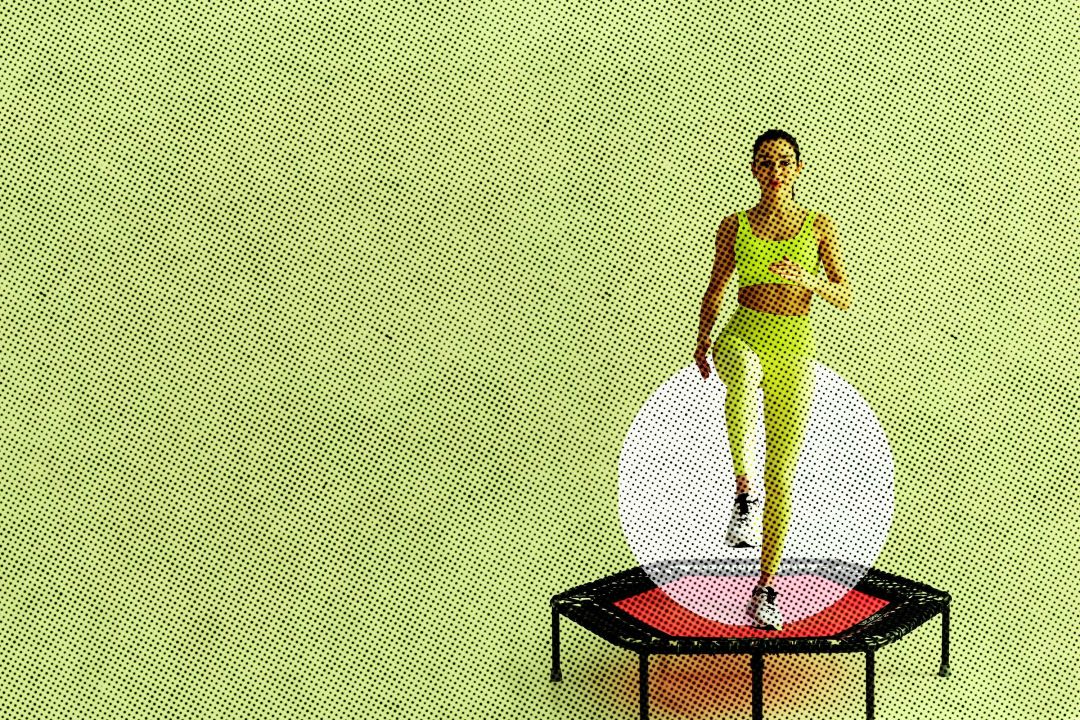What You Need to Know About Rebounding, the Popular Trampoline Fitness Trend

Image: Kari Perrin
If you were that kid in the neighborhood, the one who was jealous of every other kid's backyard trampoline, rebounding—a cardio workout in which you jump on a mini trampoline—is exactly what your inner child needs.
Rebounding became popular at the beginning of the Covid-19 pandemic, when many tried to stay fit within the confines of their living quarters. With limited space and convenience in mind, many people purchased fitness products to up their home workout game.
But besides just being super fun, is jumping on a trampoline actually good for your health?
The motion of bouncing can improve bone density, muscle strength, digestion and circulation. It can also help those recovering from injuries, surgeries or giving birth. Even NASA proved rebounding's effectiveness in a study for The Journal of Applied Physiology, finding it 68 percent more efficient than running.
Want to try it out? The Sand Barre in Naples offers bounce classes in all varieties. Studio owner Erika Carter shares more about the workout.
Why is rebounding popular?
"It's a fun, convenient workout that's perfect for all ages," says Carter. She recalls her mother using her own mini trampoline at home throughout her life. Like step or water aerobics, past generations have known the benefits of low-impact exercises like bouncing.
Carter, who began offering bounce classes at Sand Barre in 2018, says women and men in metropolitan cities have modernized the trend. Now, she hopes people in Southwest Florida will recognize that bouncing—while easy-looking—is actually a challenging and effective form of cardiovascular exercise.
What do you need to get started?
When you go to a Sand Barre class, you don't even need shoes. Carter says this helps bouncers connect with the trampoline and feel their movement. Mini trampolines, which are smaller and firmer than outdoor trampolines, can be purchased online.
Rebounding trampolines typically have bungees that can be adjusted for various intensities. That way, if you are recovering from an injury, dealing with pain or just want a lighter workout, you can loosen the firmness.
What are the physical benefits?
Beside strengthening bones, building muscle and improving balance and coordination, rebounding is also great for your insides. Carter says it can boost your immunity, and is also great for digestion and for strengthening pelvic floor muscles that become weakened after pregnancy or as people age.
"It also gets your endorphins going, because it's an intense workout, but also because it's really fun," says Carter. "There's even a move called the clothes chain bounce that most similarly mimics babies bouncing, so it's kind of like a natural instinct for us."
Carter adds that bouncing can healthily aid weight loss efforts, as bouncers can burn 300-600 calories per session. "This is more than running eight miles," she says.
What are some basic moves?
"Start by shifting your weight back and forth between your feet, and focus on bouncing down rather than up," says Carter. "This helps you maintain balance and engage major muscle groups in your legs and abdomen." Then you can move to slightly bigger bounces, raising heart rate. Other moves include jumping jacks, jumping feet in and out and scissor or star jumps.
Carter says as long as you keep moving, you are benefiting.
Who is the ideal bouncer?
While anyone can benefit from rebounding, there are particular groups who may see graeter health benefits. Carter says she has clients who have needed hip replacements and used bouncing for both pre- and post-surgery care. She says stroke victims can use gentle rebounding as a part of their rehabilitative care and those who suffer from osteoarthritis find that gentle exercise relieves joint pain.
How long is one class? How often can you bounce?
Classes typically last 30-55 minutes, but if bouncing at home, just 10 minutes per day can be beneficial. Since the workout is low-impact, you can bounce every day. Carter says some of her clients will attend beginner bouncing classes one day and then high intensity classes the next. There is no strict regimen you must follow.
Tips to begin rebounding at home:
1. Start with the most basic movements, like shifting your weight side to side, Carter says.
2. "Listen to some upbeat workout music while you bounce," says Carter. "Anything with a fast tempo that gets you pumped up will do."
3. Watch TV or a movie or listen to a podcast while bouncing, if music's not your jam. "I have clients who put their trampolines in front of the TV so they can bounce while relaxing their mind," says Carter.
4. Join an online class. The Sand Barre offers virtual classes you can tune into. Carter says there are also many guided videos on YouTube to choose from.
The Sand Barre is located at 3375 Pine Ridge Road, #202, Naples. For more information, click here or call (239) 572-8189.



